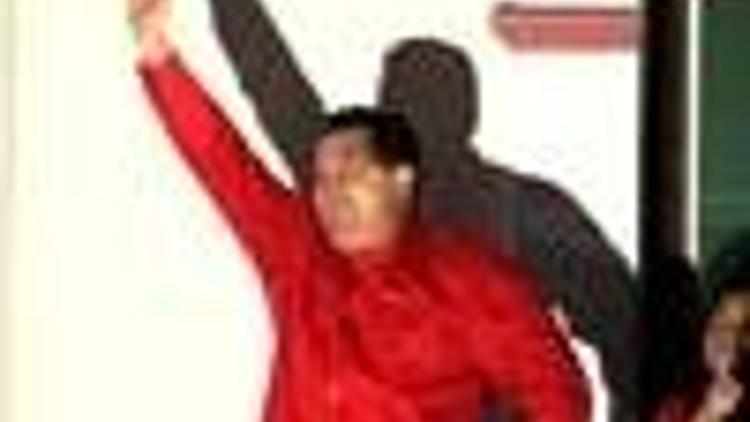Chavez wins right to seek unlimited re-elections in Venezuela
Güncelleme Tarihi:

President Hugo Chavez has won a boost for his socialist revolution after Venezuelans voted to scrap term limits on elected posts, paving the way for him to seek re-election in 2012 and beyond. Opponents accepted defeat but said Chavez is becoming a dictator.
Chavez, a flamboyant and tireless campaigner, celebrated victory with crowds of red-clad supporters late Sunday and said he intended to stand for a third term in 2012. �
Fireworks exploded in the sky and caravans of supporters celebrated in the streets, waving red flags and honking horns. Thousands of people gathered outside Miraflores Palace, where the former paratroop commander appeared on a balcony to sing the national anthem and address the crowd.
"The doors of the future are wide open," Chavez boomed from the balcony of his Miraflores palace to cheering supporters as fireworks lit up the sky.
"In 2012 there will be presidential elections for the 2013-2019 period and, unless God has planned something else, unless the people have planned something else, this soldier is now a pre-candidate for the Republics presidency," the former paratrooper was quoted by AFP as saying.
Chavez -- popular with the country’s poor for his oil-funded health care and education programs, and blamed by a vocal opposition for rising crime, corruption and inflation -- recently celebrated 10 years in power.
Chavez won a larger victory Sunday than polls had predicted, with 54.36 percent of preliminary results compared with 45.63 percent for the opposition, according to the National Electoral Council.
More than 11 million people out of some 17 million eligible voters took part, said Tibisay Lucena, the council’s president.
"DICTATORSHIP"
At their campaign headquarters, Chavez opponents hugged one another, and some cried. Several opposition leaders said they would not contest the vote.
"We’re democrats. We accept the results," AP quoted opposition leader Omar Barboza as saying.
But they said the results were skewed by Chavez’s broad use of state resources to get out the vote, through a battery of state-run news media, pressure on 2 million public employees and frequent presidential speeches which all television stations are required to air.
Opponents say Chavez already has far too much power, with the courts, the legislature and the election council all under his influence. Removing the 12-year presidential term limit, they say, makes him unstoppable.
"Effectively this will become a dictatorship," Barboza told The Associated Press. "It’s control of all the powers, lack of separation of powers, unscrupulous use of state resources, persecution of adversaries."
Voters on both sides said the referendum was crucial to the future of Venezuela, a deeply polarized country where Chavez has spent a tumultuous decade in power channeling tremendous oil wealth into combating gaping social inequality.
Chavez supporters say their president has given poor Venezuelans cheap food, free education and quality health care, and empowered them with a discourse of class struggle after decades of U.S.-backed governments that favored the rich.
"This victory saved the revolution," said Gonzalo Mosqueda, a 60-year-old shopkeeper, sipping rum from a plastic cup outside the palace. "Without it everything would be at risk - all the social programs, and everything he has done for the poor."
Chavez took office in 1999 and won support for a new constitution the same year that allowed the president to serve two six-year terms, barring him from the 2012 elections. Sundays vote was his second attempt to change that; voters rejected a broader referendum in December
2007.
Venezuela’s leftist allies in Latin America have followed the model. Ecuador pushed through a new constitution in September and Bolivia did so in January. Both loosened rules on presidential re-election. Nicaragua’s ruling Sandinistas also plan to propose an amendment that would let Daniel Ortega run for another consecutive term.

